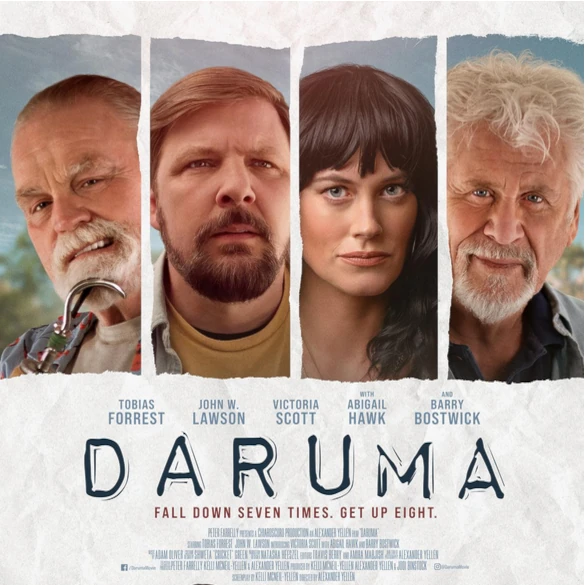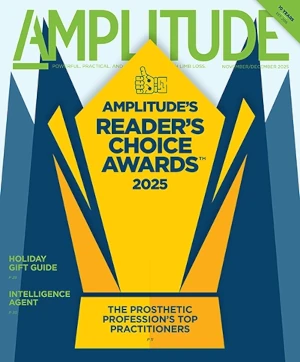
The long wait is finally over: Daruma will make its theatrical premiere next month, with screenings in seven cities across the country starting on November 15. It will make movie history in the process, becoming the first American feature film to feature two authentically cast disabled protagonists. Bilateral amputee John Lawson and wheelchair user Tobias Forrest co-star as Robert and Patrick, an ornery odd couple who have to ferry a child across the country without killing each other. “They don’t fall into the usual disability tropes,” says Lawson, who’s spent most of his career pushing Hollywood to become more inclusive. “They’re just normal, flawed people trying to live their lives.”
The official trailer drops on November 8, and you’re invited to the watch party. It’s a free event that includes swag bags, special giveaways, and conversation with the stars and production team. Visit the film’s website for event details, signup info, and a list of screening locations and dates. Daruma will debut on streaming next month as well, so you can see it no matter where you live.
It feels like we’ve been following Daruma‘s path to the big screen forever, and we only heard about it two and a half years ago. The production’s roots run much deeper: Its first footage was shot way back in 2017, which may as well be a century ago as far as disability-themed entertainment is concerned. Multiple thresholds have been crossed since then, including CODA‘s Best Picture award, Katy Sullivan’s Tony nomination, and the now-routine appearance of TV shows that feature amputee characters played by amputee actors (viz. Echo, La Brea, Tracker, Best Foot Forward). Disability storytelling is far more common and authentic today than it was when Daruma snapped its first clapperboard.
Even so, the film breaks new ground and may open the door to other authentically cast films about disability. It played to packed houses on the festival circuit last year, and Lawson and Forrest both received Best Actor trophies (from the Slamdance Film Festival and Media Access Awards, respectively). Variety, The Hollywood Reporter, and other high-profile industry pubs chimed in with glowing reviews.
All that’s left is for you to see it. Last week we caught up with John Lawson (who first told us about Daruma in 2022) to get his thoughts about the film’s long-awaited release.
Fill me in on everything that’s happened since last year. How did Daruma find a distributor?
We played at Slamdance this January, which happens at the same time as Sundance, and we had two sold-out performances. Literally standing room only. It was crazy. That sort of closed out our festival run, and then we started looking at the distribution part of it. We ended up going with Freestyle. The theatrical run is November 15th through the 21st in seven major cities: Chicago, Cincinnati, Minneapolis, Boston, New York, DC, and LA. It’s been quite the journey, but it’s been a lot of fun, and it’s just great to see the film get a chance and, hopefully, make a difference in the industry.
Daruma seems to dovetail with this broader campaign throughout the industry to create more opportunities for disabled talent and crack the door open a little wider for more people to follow in.
We hope it will, because it is the first film in the history of American filmmaking to authentically cast both lead actors with disabilities. It’s never been done before. And the film’s not even about disability. It’s just two guys who are on this physical and emotional journey, investigating and discovering the human experience. Their disabilities are never really brought up or talked about, except we make one joke about it in the film.
In film and television today, most people with disabilities fall into the three common tropes. There’s the inspirational super crip—the person with disabilities as a heroic figure that “overcomes” their disability in extraordinary ways and becomes just like everybody else. And then, of course, there’s the tragic victim—that’s the character whose life is primarily defined by their suffering. And the longest running trope is the disabled villain who has become twisted and has a violent nature because of their disability or their physical difference.
This film is more about male psychological toxicity, about guys who aren’t able to deal with their problems. The characters are very well rounded. The pendulum swings real wide for my character, Robert, from tenderness of understanding for Patrick to godlike wrath. That’s why it was such a great part, because my character has these tender moments and these happy moments, yet he unleashes this wrath that he can’t control. The characters are so well thought and well rounded, and they don’t fall into the usual tropes. They’re just guys with flaws, like anybody else.
And that enables nondisabled viewers to recognize themselves in these characters, rather than viewing the characters from a distance.
That’s it, exactly. I want viewers to see themselves represented in a way that reflects the reality of their experiences, whether or not disability is a major theme in their life or not. And I want producers, directors, and casting directors, to go, “Hey, I could just see this actor with no hands playing a grandfather, or an old man in the community.”
Instead of just automatically confining you to disability roles.
That’s what I hope. And, you know, that kind of representation could help people with disabilities achieve more self acceptance or confidence, or just a sense that they belong in the world.
Are there other movies like Daruma that are in the development pipeline that might get a boost from your success?
Not that I know of. I wish I did know some projects so I could get hired. For me, it’s like, where’s the next job? I’ve been at this for 35 years or more, and it took a while to get people to even see me as a trained actor rather than just the guy with hooks. Right before COVID, I was finally starting to get better roles where I might have multiple scenes in an episode of a TV series. Then COVID hit, and everything kind of shut down. After COVID everything started back up, and then the writer’s strike hit, and then the actor strike. Because of all that, everything’s delayed else, and there is just not a lot going on right now. All the stuff that was planned for 2023 is now being done in 2024, so it’s just really slowed down.
It does feel to me that there is momentum happening for as far as there is more opportunity for people with disabilities to get represented in entertainment. Am I imagining that? Or do you feel like there is at least a little progress?
I think there is a little bit of progress. I gave a speech at one of the studios recenetly, and I was looking back through some old notes and found the notes from my first panel discussion, 35 years ago. At that time, 35 years ago, the numbers of people in film and television with disability was nine-tenths of 1 percent. Flash forward to today, and according to the latest USC Annenberg study, we’re only at two percent. Now there’s a couple of ways to look at that. We can say it’s great, we’ve doubled the amount of people with disabilities in film and television. Or we can say that about 25 percent of today’s population has some form of disability, but only 2 percent of the characters they see in entertainment have a disability, so we still have a long way to go.
Where is Daruma going to be streamed?
We don’t have the details yet. Freestyle is a division of Hulu, which is a division of ABC/Disney. But I honestly don’t know. It will be available digitally somewhere, and it will be streaming as of November 15, the same time as the theatrical screening. One reason for that is because a lot of people with disabilities aren’t able to make it to the theater for whatever reason. We want everybody to be able to see it at the same time.
It was 2017 when we did the proof of concept trailer for Daruma. We shot a couple little scenes, and they shopped it around, and people were asking questions like, “Who are thinking about to play the guy in the wheelchair?” And they said, “We’re going to stay with these two guys. We think we’ve got the right cast.” So it’s been seven years that they stayed with us, and we’ve hung with them, and I’m certainly glad we did. It’s a good film. We go to movies to feel something, and Daruma is a movie that will make you feel.





